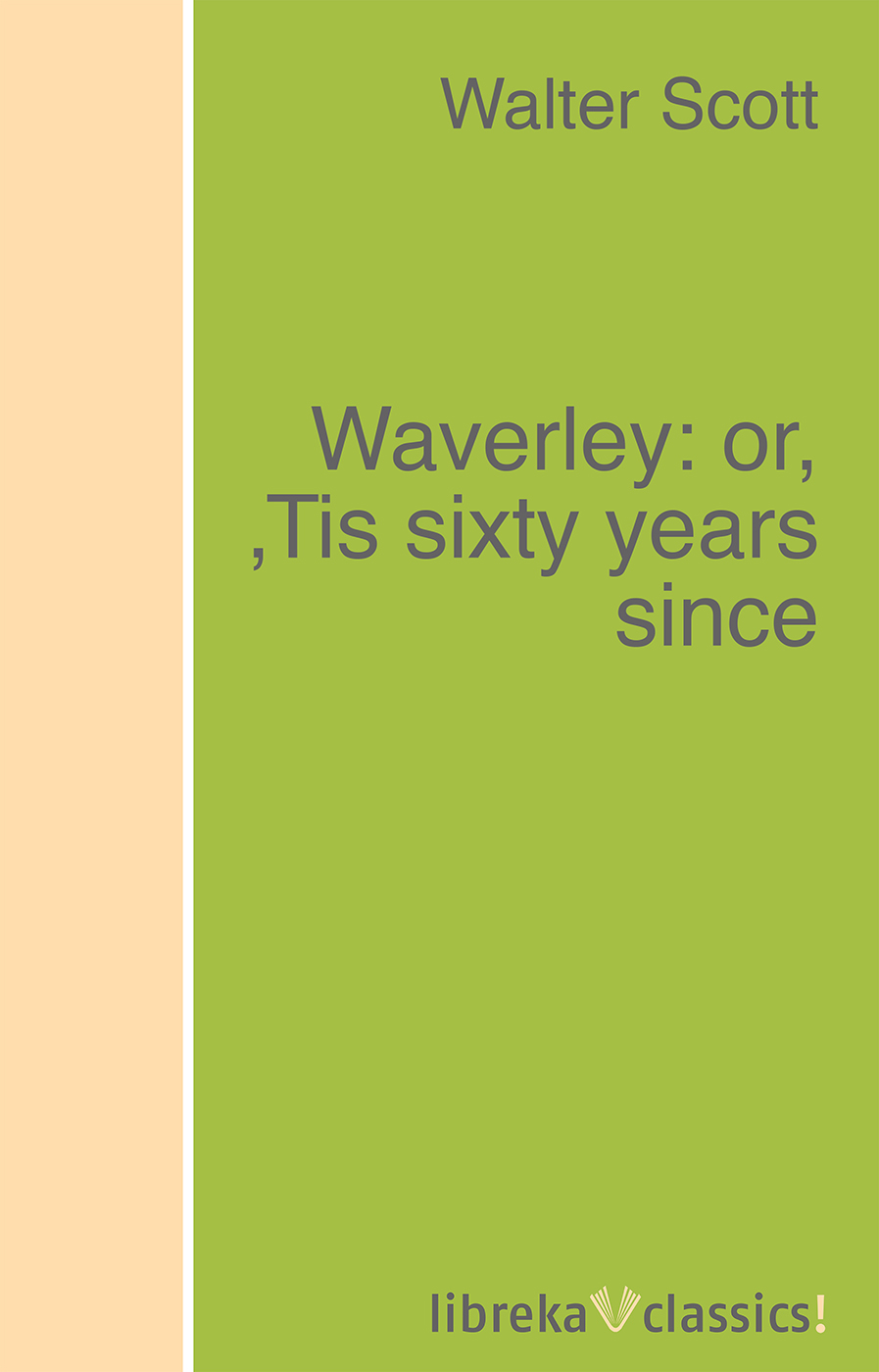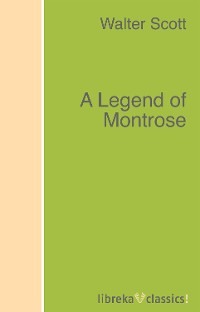
Полная версия
Waverley: or, 'Tis sixty years since


Titel: Waverley: or, 'Tis sixty years since
von William Shakespeare, H. G. Wells, Henry Van Dyke, Thomas Carlyle, Oscar Wilde, Joseph Conrad, Henry James, Anthony Hope, Henry Fielding, Giraldus Cambrensis, Daniel Defoe, Grammaticus Saxo, Edgar Rice Burroughs, Hugh Lofting, Agatha Christie, Sinclair Lewis, Eugène Brieux, Upton Sinclair, Booth Tarkington, Sax Rohmer, Jack London, Anna Katharine Green, Sara Jeannette Duncan, Xenophon, Alexandre Dumas père, John William Draper, Alice Christiana Thompson Meynell, Bram Stoker, Honoré de Balzac, William Congreve, Louis de Rougemont, Nikolai Vasilievich Gogol, Rolf Boldrewood, François Rabelais, Lysander Spooner, B. M. Bower, Henry Rider Haggard, William Hickling Prescott, Lafcadio Hearn, Robert Herrick, Jane Austen, Mark Twain, Mary Roberts Rinehart, Charles Babbage, Kate Douglas Smith Wiggin, Frank L. Packard, George Meredith, John Merle Coulter, Irvin S. Cobb, Edwin Mims, John Tyndall, Various, Charles Darwin, Sidney Lanier, Henry Lawson, Niccolò Machiavelli, George W. Crile, Théophile Gautier, Noah Brooks, James Thomson, Zane Grey, J. M. Synge, Virginia Woolf, Conrad Aiken, Edna St. Vincent Millay, Helen Cody Wetmore, Ayn Rand, Sir Thomas Malory, Gustave Flaubert, Edmond Rostand, Charlotte Brontë, Edith Wharton, Giles Lytton Strachey, Myrtle Reed, Ernest Bramah, Jules Verne, H. L. Mencken, H. Stanley Redgrove, Victor Lefebure, Edna Lyall, John Masefield, Charles Kingsley, Robert Burns, Edgar Lee Masters, Victor [pseud.] Appleton, Ellis Parker Butler, Mary Lamb, Charles Lamb, Johann Wolfgang von Goethe, Kenneth Grahame, Charles Dickens, John Ruskin, John Galt, James J. Davis, Owen Wister, William Blades, Sir Hall Caine, Sir Max Beerbohm, Baron Edward John Moreton Drax Plunkett Dunsany, Bret Harte, E. Phillips Oppenheim, Thomas Henry Huxley, A. B. Paterson, John N. Reynolds, Walter Dill Scott, Hans Gustav Adolf Gross, T. S. Eliot, Walt Whitman, Arthur Ransome, Jane Addams, Elizabeth, David Lindsay, Helen Bannerman, Charles A. Oliver, J. M. Barrie, Robert F. Murray, Andrew Lang, Jerome K. Jerome, Francis Thompson, Sydney Waterlow, Andrew Dickson White, Benjamin N. Cardozo, Karl Marx, Edouard Louis Emmanuel Julien Le Roy, Margaret Hill McCarter, Sir Donald Mackenzie Wallace, Howard Trueman, L. M. Montgomery, Frank T. Bullen, Baron Alfred Tennyson Tennyson, Jonathan Nield, Henry Wadsworth Longfellow, Charles Reade, Ouida, Washington Irving, Benjamin Louis Eulalie de Bonneville, Sir Walter Scott, Stewart Edward White, Arthur Hugh Clough, Baron Edward Bulwer Lytton Lytton, C.-F. Volney, T. Troward, graf Leo Tolstoy, Christopher Morley, James Madison, Alexander Hamilton, John Jay, Gilbert White, Percival Lowell, Frederick Marryat, Robert Graves, Thomas Holmes, Wilkie Collins, Maria Edgeworth, Katherine Mansfield, E. Nesbit, Olive Schreiner, Jeronimo Lobo, O. Henry, James Slough Zerbe, Donald Ogden Stewart, Johanna Spyri, Eleanor H. Porter, William Tatem Tilden, Sol Plaatje, Rafael Sabatini, William Makepeace Thackeray, George Gissing, Maksim Gorky, Baron Thomas Babington Macaulay Macaulay, H. G. Keene, Saki, R. B. Cunninghame Graham, Thomas Hughes, David Nunes Carvalho, Vicente Blasco Ibáñez, Carry Amelia Nation, John Fiske, Bernard Shaw, Elbridge Streeter Brooks, William Holmes McGuffey, Edward Everett Hale, Louis Ginzberg, Chester K. Steele, Christopher Marlowe, Plato, John Lord, Shakespeare, Martin Luther, Frances Hodgson Burnett, Howard Pyle, Charles Morris, Edward Carpenter, Maurice Leblanc, James Boswell, William Osler, William Ernest Henley, Theron Q. Dumont, Horatio Alger, Abraham Myerson, Joel Benton, Eden Phillpotts, Anonymous, Robert Louis Stevenson, Lloyd Osbourne, Cleland Boyd McAfee, Robert Williams Wood, H. C. Andersen, Edna Ferber, James Stephens, John Jacob Astor, Alexandre Dumas fils, Hilda Conkling, J. Storer Clouston, Julian Hawthorne, Ernest Albert Savage, Mary Eleanor Wilkins Freeman, Fernando de Rojas, Richard Harding Davis, Charles Whibley, Thomas Dixon, Sir Arthur Conan Doyle, George MacDonald, Thomas H. Burgoyne, Belle M. Wagner, Émile Gaboriau, à Kempis Thomas, United States. Central Intelligence Agency, Herbert Darling Foster, John Chipman Farrar, Lucius Apuleius, Olive Gilbert, Sojourner Truth, Arthur Judson Brown, Burbank L. Todd, Gaston Leroux, Margaret Sanger, Jr. Martin Luther King, Mary Johnston, S. A. Reilly, G. K. Chesterton, Elizabeth Cleghorn Gaskell, George Iles, E. W. Hornung, Edward Huntington Williams, Henry Smith Williams, Nathaniel W. Stephenson, Ellen Marriage, Homer, Anton Pavlovich Chekhov, J. F. C. Hecker, John Milton, Natalie Sumner Lincoln, Baroness Emmuska Orczy Orczy, Thomas Bailey Aldrich, Mary Esther Miller MacGregor, William MacLeod Raine, Earl Derr Biggers, Helen Nicolay, Ruth Ogden, Thornton W. Burgess, Mary Murdoch Mason, Auguste Groner, John Lawson, Emma Wolf, Theodore Dreiser, Roger Ascham, John Charles McNeill, Owen Meredith, L. Adams Beck, Rudyard Kipling, Alphonse Daudet, Theodore Roosevelt, Henry Cabot Lodge, Anthony Trollope, A. A. Milne, Elia Wilkinson Peattie, J. Fitzgerald Molloy, James Fenimore Cooper, Alexander Whyte, Jean-Henri Fabre, E. R. Punshon, Neltje Blanchan, Porter Lander MacClintock, William Darnall MacClintock, Ida Pfeiffer, Stanley John Weyman, Max Brand, Herman Melville, William Joseph Long, William Cotton, Dorothy Kilner, Sarah Fielding, Samuel Butler, A. C. Seward, Harold MacGrath, Nathaniel Hawthorne, William J. Kountz, Arthur B. Reeve, Susan Fenimore Cooper, Richard Brinsley Sheridan, Anatole France, William Blake, Elizabeth Davis Bancroft, Carl von Clausewitz, Gildas, Charlotte Perkins Gilman, Melvin Linwood Severy, E. H. Chapin, Sir Philip Sidney, John Buchan, fl. 796 Nennius, Aristotle, Jean Baptiste Racine, Ellen Robena Field, Mitzi Perdue, Richard M. Stallman, John Bunyan, Andy Adams, Gideon Wurdz, Sir Robert Naunton, Paul Hentzner, Dante Alighieri, Friedrich Wilhelm Nietzsche, Aldous Huxley, Miguel de Cervantes Saavedra, Elizabeth Barrett Browning, C. S. Lewis, P. G. Wodehouse, ca. 1824-1874 George W. Sands, Frank Richard Stockton, Freeman Wills Crofts, Marie Belloc Lowndes, Avery Hopwood, Jeffery Farnol, August Niemann, Molière, J. Breckenridge Ellis, L. W. King, Eleanor Farjeon, Maurice Maeterlinck
ISBN 978-3-7429-1968-7
Alle Rechte vorbehalten.
Es ist ohne vorherige schriftliche Erlaubnis nicht gestattet, dieses Werk im Ganzen oder in Teilen zu vervielfältigen oder zu veröffentlichen.
WAVERLEY
or 'TIS SIXTY YEARS SINCE
by SIR WALTER SCOTT BART.
Under which King, Bezonian? speak, or die! Henry IV, Part II.
Contents
INTRODUCTION—(1829) WAVERLEY or 'TIS SIXTY YEARS SINCE
CHAPTER I CHAPTER II CHAPTER III CHAPTER IV CHAPTER V CHAPTER VI CHAPTER VII CHAPTER VIII CHAPTER IX CHAPTER X CHAPTER XI CHAPTER XII CHAPTER XIII CHAPTER XIV CHAPTER XV CHAPTER XVI CHAPTER XVII CHAPTER XVIII CHAPTER XIX CHAPTER XX CHAPTER XXI CHAPTER XXII CHAPTER XXIII CHAPTER XXIV CHAPTER XXV CHAPTER XXVI CHAPTER XXVII CHAPTER XXVIII CHAPTER XXIX CHAPTER XXX CHAPTER XXXI CHAPTER XXXII CHAPTER XXXIII CHAPTER XXXIV CHAPTER XXXV CHAPTER XXXVI CHAPTER XXXVII CHAPTER XXXVIII CHAPTER XXXIX CHAPTER XL CHAPTER XLI CHAPTER XLII CHAPTER XLIII CHAPTER XLIV CHAPTER XLV CHAPTER XLVI CHAPTER XLVII CHAPTER XLVIII CHAPTER XLIX CHAPTER L CHAPTER LI CHAPTER LII CHAPTER LIII CHAPTER LIV CHAPTER LV CHAPTER LVI CHAPTER LVII CHAPTER LVIII CHAPTER LIX CHAPTER LX CHAPTER LXI CHAPTER LXII CHAPTER LXIII CHAPTER LXIV CHAPTER LXV CHAPTER LXVI CHAPTER LXVII CHAPTER LXVIII: CHAPTER LXIX CHAPTER LXX CHAPTER LXXI CHAPTER LXXIINOTES GLOSSARY
INTRODUCTION—(1829)
The plan of this Edition leads me to insert in this place some account of the incidents on which the Novel of WAVERLEY is founded. They have been already given to the public, by my late lamented friend, William Erskine, Esq. (afterwards Lord Kinneder), when reviewing the 'Tales of My Landlord' for the QUARTERLY REVIEW, in 1817. The particulars were derived by the Critic from the Author's information. Afterwards they were published in the Preface to the CHRONICLES OF THE CANONGATE. They are now inserted in their proper place.
The mutual protection afforded by Waverley and Talbot to each other, upon which the whole plot depends, is founded upon one of those anecdotes which soften the features even of civil war; and as it is equally honourable to the memory of both parties, we have no hesitation to give their names at length. When the Highlanders, on the morning of the battle of Preston, 1745, made their memorable attack on Sir John Cope's army, a battery of four field-pieces was stormed and carried by the Camerons and the Stewarts of Appine. The late Alexander Stewart of Invernahyle was one of the foremost in the charge, and observing an officer of the King's forces, who, scorning to join the flight of all around, remained with his sword in his hand, as if determined to the very last to defend the post assigned to him, the Highland gentleman commanded him to surrender, and received for reply a thrust, which he caught in his target. The officer was now defenceless, and the battle-axe of a gigantic Highlander (the miller of Invernahyle's mill) was uplifted to dash his brains out, when Mr. Stewart with difficulty prevailed on him to yield. He took charge of his enemy's property, protected his person, and finally obtained him liberty on his parole. The officer proved to be Colonel Whitefoord, an Ayrshire gentleman of high character and influence, and warmly attached to the House of Hanover; yet such was the confidence existing between these two honourable men, though of different political principles, that while the civil war was raging, and straggling officers from the Highland army were executed without mercy, Invernahyle hesitated not to pay his late captive a visit, as he returned to the Highlands to raise fresh recruits, on which occasion he spent a day or two in Ayrshire among Colonel Whitefoord's Whig friends, as pleasantly and as good-humouredly as if all had been at peace around him.
After the battle of Culloden had ruined the hopes of Charles Edward, and dispersed his proscribed adherents, it was Colonel Whitefoord's turn to strain every nerve to obtain Mr. Stewart's pardon. He went to the Lord Justice-Clerk, to the Lord-Advocate, and to all the officers of state, and each application was answered by the production of a list, in which Invernahyle (as the good old gentleman was wont to express it) appeared 'marked with the sign of the beast!' as a subject unfit for favour or pardon.
At length Colonel Whitefoord applied to the Duke of Cumberland in person. From him, also, he received a positive refusal. He then limited his request, for the present, to a protection for Stewart's house, wife, children, and property. This was also refused by the Duke; on which Colonel Whitefoord, taking his commission from his bosom, laid it on the table before his Royal Highness with much emotion, and asked permission to retire from the service of a sovereign who did not know how to spare a vanquished enemy. The Duke was struck, and even affected. He bade the Colonel take up his commission, and granted the protection he required. If was issued just in time to save the house, corn, and cattle at Invernahyle, from the troops who were engaged in laying waste what it was the fashion to call 'the country of the enemy.' A small encampment of soldiers was formed on Invernahyle's property, which they spared while plundering the country around, and searching in every direction for the leaders of the insurrection, and for Stewart in particular. He was much nearer them than they suspected; for, hidden in a cave (like the Baron of Bradwardine), he lay for many days so near the English sentinels, that he could hear their muster-roll called, His food was brought to him by one of his daughters, a child of eight years old, whom Mrs. Stewart was under the necessity of entrusting with this commission; for her own motions, and those of all her elder inmates, were closely watched. With ingenuity beyond her years, the child used to stray about among the soldiers, who were rather kind to her, and thus seize the moment when she was unobserved, and steal into the thicket, when she deposited whatever small store of provisions she had in charge at some marked spot, where her father might find it. Invernahyle supported life for several weeks by means of these precarious supplies; and as he had been wounded in the battle of Culloden, the hardships which he endured were aggravated by great bodily pain. After the soldiers had removed their quarters, he had another remarkable escape.
As he now ventured to his own house at night, and left it in the morning, he was espied during the dawn by a party of the enemy, who fired at and pursued him. The fugitive being fortunate enough to escape their search, they returned to the house, and charged the family with harbouring one of the proscribed traitors. An old woman had presence of mind enough to maintain that the man they had seen was the shepherd. 'Why did he not stop when we called to him?' said the soldier.—'He is as deaf, poor man, as a peat-stack,' answered the ready-witted domestic.—'Let him be sent for, directly.' The real shepherd accordingly was brought from the hill, and as there was time to tutor him by the way, he was as deaf when he made his appearance, as was necessary to sustain his character. Invernahyle was afterwards pardoned under the Act of Indemnity.
The Author knew him well, and has often heard these circumstances from his own mouth. He was a noble specimen of the old Highlander, far descended, gallant, courteous, and brave, even to chivalry. He had been OUT, I believe, in 1715 and 1745; was an active partaker in all the stirring scenes which passed in the Highlands betwixt these memorable eras; and, I have heard, was remarkable, among other exploits, for having fought a duel with the broadsword with the celebrated Rob Roy MacGregor, at the Clachan of Balquhidder.
Invernahyle chanced to be in Edinburgh when Paul Jones came into the Frith of Forth, and though then an old man, I saw him in arms, and heard him exult (to use his own words) in the prospect of 'drawing his claymore once more before he died.' In fact, on that memorable occasion, when the capital of Scotland was menaced by three trifling sloops or brigs, scarce fit to have sacked a fishing village, he was the only man who seemed to propose a plan of resistance. He offered to the magistrates, if broadswords and dirks could be obtained, to find as many Highlanders among the lower classes, as would cut off any boat's-crew who might be sent into a town full of narrow and winding passages, in which they were like to disperse in quest of plunder. I know not if his plan was attended to; I rather think it seemed too hazardous to the constituted authorities, who might not, even at that time, desire to see arms in Highland hands. A steady and powerful west wind settled the matter, by sweeping Paul Jones and his vessels out of the Frith.
If there is something degrading in this recollection, it is not unpleasant to compare it with those of the last war, when Edinburgh, besides regular forces and militia, furnished a volunteer brigade of cavalry, infantry, and artillery, to the amount of six thousand men and upwards, which was in readiness to meet and repel a force of a far more formidable description than was commanded by the adventurous American. Time and circumstances change the character of nations and the fate of cities; and it is some pride to a Scotchman to reflect, that the independent and manly character of a country willing to entrust its own protection to the arms of its children, after having been obscured for half a century, has, during the course of his own lifetime, recovered its lustre.
Other illustrations of Waverley will be found in the Notes at the foot of the pages to which they belong. [In this etext they are embedded in the text in square brackets.] Those which appeared too long to be so placed are given at the end of the volume.
WAVERLEY or 'TIS SIXTY YEARS SINCE
CHAPTER I
INTRODUCTORY
The title of this work has not been chosen without the grave and solid deliberation, which matters of importance demand from the prudent. Even its first, or general denomination, was the result of no common research or selection, although, according to the example of my predecessors, I had only to seize upon the most sounding and euphonic surname that English history or topography affords, and elect it at once as the title of my work, and the name of my hero. But, alas! what could my readers have expected from the chivalrous epithets of Howard, Mordaunt, Mortimer, or Stanley, or from the softer and more sentimental sounds of Belmour, Belville, Belfield, and Belgrave, but pages of inanity, similar to those which have been so christened for half a century past? I must modestly admit I am too diffident of my own merit to place it in unnecessary opposition to preconceived associations; I have, therefore, like a maiden knight with his white shield, assumed for my hero, WAVERLEY, an uncontaminated name, bearing with its sound little of good or evil, excepting what the reader shall hereafter be pleased to affix to it. But my second or supplemental title was a matter of much more difficult election, since that, short as it is, may be held as pledging the author to some special mode of laying his scene, drawing his characters, and managing his adventures. Had I, for example, announced in my frontispiece, 'Waverley, a Tale of other Days,' must not every novel reader have anticipated a castle scarce less than that of Udolpho, of which the eastern wing had long been uninhabited, and the keys either lost, or consigned to the care of some aged butler or housekeeper, whose trembling steps, about the middle of the second volume, were doomed to guide the hero, or heroine, to the ruinous precincts? Would not the owl have shrieked and the cricket cried in my very title-page? and could it have been possible for me, with a moderate attention to decorum, to introduce any scene more lively than might be produced by the jocularity of a clownish but faithful valet, or the garrulous narrative of the heroine's fille-de-chambre, when rehearsing the stories of blood and horror which she had heard in the servants' hall? Again, had my title borne 'Waverley, a Romance from the German,' what head so obtuse as not to image forth a profligate abbot, an oppressive duke, a secret and mysterious association of Rosycrucians and Illuminati, with all their properties of black cowls, caverns, daggers, electrical machines, trap-doors, and dark-lanterns? Or if I had rather chosen to call my work a 'Sentimental Tale,' would it not have been a sufficient presage of a heroine with a profusion of auburn hair, and a harp, the soft solace of her solitary hours, which she fortunately finds always the means of transporting from castle to cottage, although she herself be sometimes obliged to jump out of a two-pair-of-stairs window, and is more than once bewildered on her journey, alone and on foot, without any guide but a blowzy peasant girl, whose jargon she hardly can understand? Or again, if my WAVERLEY had been entitled 'A Tale of the Times,' wouldst thou not, gentle reader, have demanded from me a dashing sketch of the fashionable world, a few anecdotes of private scandal thinly veiled, and if lusciously painted, so much the better? a heroine from Grosvenor Square, and a hero from the Barouche Club or the Four-in-hand, with a set of subordinate characters from the elegantes of Queen Anne Street East, or the dashing heroes of the Bow Street Office? I could proceed in proving the importance of a title-page, and displaying at the same time my own intimate knowledge of the particular ingredients necessary to the composition of romances and novels of various descriptions: but it is enough, and I scorn to tyrannize longer over the impatience of my reader, who is doubtless already anxious to know the choice made by an author so profoundly versed in the different branches of his art.
By fixing, then, the date of my story Sixty Years before the present 1st November, 1805, I would have my readers understand, that they will meet in the following pages neither a romance of chivalry, nor a tale of modern manners; that my hero will neither have iron on his shoulders, as of yore, nor on the heels of his boots, as is the present fashion of Bond Street; and that my damsels will neither be clothed 'in purple and in pall,' like the Lady Alice of an old ballad, nor reduced to the primitive nakedness of a modern fashionable at a rout. From this my choice of an era the understanding critic may further presage, that the object of my tale is more a description of men than manners. A tale of manners, to be interesting, must either refer to antiquity so great as to have become venerable, or it must bear a vivid reflection of those scenes which are passing daily before our eyes, and are interesting from their novelty. Thus the coat-of-mail of our ancestors, and the triple-furred pelisse of our modern beaux, may, though for very different reasons, be equally fit for the array of a fictitious character; but who, meaning the costume of his hero to be impressive, would willingly attire him in the court dress of George the Second's reign, with its no collar, large sleeves, and low pocket-holes? The same may be urged, with equal truth, of the Gothic hall, which, with its darkened and tinted windows, its elevated and gloomy roof, and massive oaken table garnished with boar's-head and rosemary, pheasants and peacocks, cranes and cygnets, has an excellent effect in fictitious description. Much may also be gained by a lively display of a modern fete, such as we have daily recorded in that part of a newspaper entitled the Mirror of Fashion, if we contrast these, or either of them, with the splendid formality of an entertainment given Sixty Years since; and thus it will be readily seen how much the painter of antique or of fashionable manners gains over him who delineates those of the last generation.






